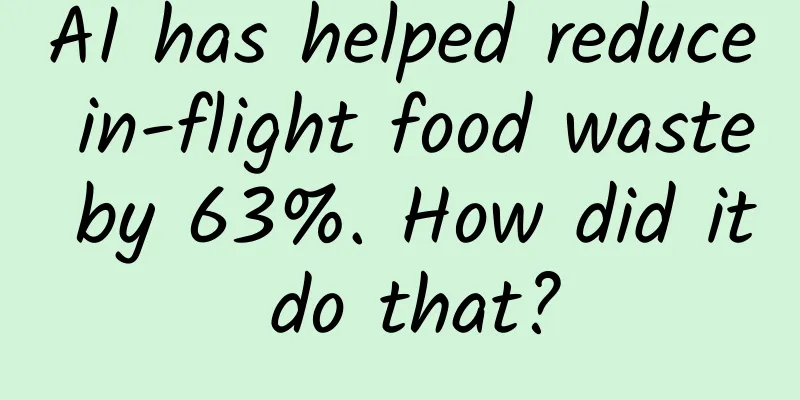AI has helped reduce in-flight food waste by 63%. How did it do that?

|
How AI can help airlines reduce food waste on board Reprinted from China Civil Aviation News KLM uses artificial intelligence to reduce food waste on board Cao Bin, China Civil Aviation News KLM Royal Dutch Airlines is using artificial intelligence (AI) to reduce food waste on board. The AI program allows KLM to more accurately predict the actual number of passengers who have already purchased tickets and calculate the exact number of meals required based on the expected number of passengers on each flight, thereby reducing food waste by up to 63%, saving more than 100,000 kilograms of food each year. “Investing in digital technology is a top priority for KLM,” said KLM CEO Hermann Schmidt. “Using artificial intelligence helps us significantly improve the efficiency of our flight operations and make them more sustainable. Reducing food waste is a great example, saving tens of thousands of meals a year.” KLM is working to use AI to determine the number of meals on board to reduce food waste. Not all booked passengers will actually board the plane. Depending on the class, 3% to 5% of booked passengers will not board (on time). TRAYS is the first AI model specifically designed for KLM's catering business. TRAYS predicts the actual number of people on board based on historical data. The Meals on Board System (MOBS) receives the estimated number of people on board in three different cabins on each flight: World Business Class, Premium Economy Class, and Economy Class. The AI model prediction starts 17 days before the flight and ends 20 minutes before the flight. This means that KLM can predict the actual number of people on board as accurately as possible, covering the entire catering process from procurement to assembly, reducing excess meal supply. The AI model TRAYS was launched by Kickstart AI at the end of last year. The project brought together talents from leading companies including KLM, BOLO, Royal Ahold Delhaize Group, Netherlands Railways and ING to develop the model. A three-month survey showed that using this model to predict food saved 63% compared to preparing meals for each passenger who booked a ticket. The effect was significant on KLM's intercontinental flights departing from Amsterdam Schiphol Airport, reducing the amount of food discarded by 2.5 portions (1.3 kg) per flight. All KLM flights provided with catering services at Schiphol Airport can save 111,000 kg of meals a year. KLM is also promoting artificial intelligence in other business areas. Artificial intelligence is crucial to improving the intelligence level of aircraft maintenance. AI can also predict bad weather, which is conducive to making the best route planning in advance and continuing to operate flights. In addition, AI can provide passengers with customized travel guides after booking tickets. (Cao Bin) |
<<: Hot topic! Is the crunchy Gongcai in hot pot actually dried lettuce?
>>: Willows have sprouted. Can they be eaten? How? Where?
Recommend
Are there any risks of infection after returning from various places after the holidays? CDC reminds: These types of people should postpone their return to work!
The Spring Festival holiday is over and many peop...
Why did this "one thousandth" superheavy elementary particle alarm physicists around the world?
|||| Written by Zhang Hao (Associate Researcher, ...
3 advanced methodologies for brand marketing!
Recently, Sister Mulan has been talking with some...
Investment in the power battery industry remains hot, and the industry reshuffle is accelerating
Recently, with the booming new energy vehicle mar...
Thinking about the whole process of brand planning
A brand is a trust in a company and its products ...
How does keep promote itself? What are the points worth learning from?
Keep has currently gone through 5 rounds of finan...
Postpartum repair and slim waist postpartum body shaping Muquan two classes with notes
Postpartum repair and slim waist, postpartum body ...
How much does it cost to attract investment in Yangzhou’s e-book mini program? What is the investment price for Yangzhou e-book mini program?
How much does it cost to attract investment for t...
Astra: Fight again and again despite repeated failures, so what if the rocket flies
On August 29, 2021, Astra's "Rocket 3.3&...
How did Facebook get to 2 billion users? The answer is "science" and "empathy"
Yesterday afternoon, Zuckerberg said more than 65...
Can “not eating after noon” help you lose weight? A year-long experiment found…
Reviewer of this article: Chen Haixu, Deputy Dire...
Water celery or poison hemlock? Don't pick wild vegetables on the roadside
As spring arrives and the temperature rises, many...
Fukushima nuclear radiation waste leak risk increases
According to Kyodo News on August 18, the radioac...
Why Apple abandoned Helvetica - revealing the secret of iOS9's ugly fonts
Since the first iPhone, Apple has used Helvetica ...
What other uses does the body painting of indigenous Africans have besides decoration?
In some primitive tribes in Africa, Australia, Pa...









